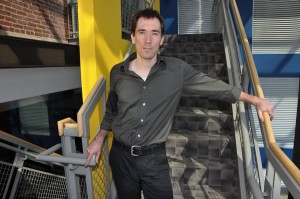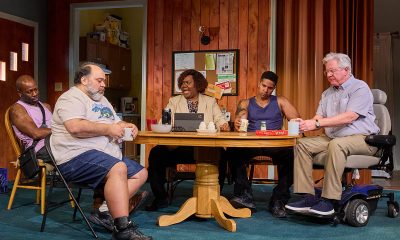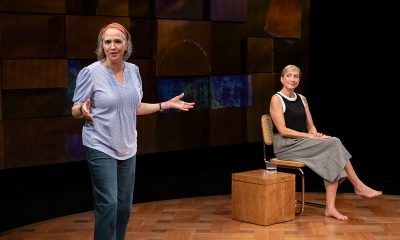Theater
Studio’s Muse
New artistic director first to succeed founder Zinoman

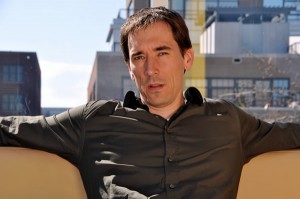
David Muse, the new artistic director of the Studio Theatre. (Washington Blade photo by Michael Key)
He has been labeled a “wunderkind,” but no one would mistake this young man who has taken the helm of the Studio Theatre as a “wild child,” a Rimbaud on the rampage, scary, impudent, a feral genius in a state of artistic nature.
For with David Muse, who became at age 36 Studio’s second artistic director when founder Joy Zinoman passed him the reins last September, the clearest impression is of a young man with artistic time and motion studies on his mind, with a bookkeeper’s talent for cutting costs or adding a new line to the budget — either way, it’s the temperament of a manager.
But that would be the wrong impression also.
The best explanation about what makes David Muse run — as an artist himself, Yale-educated twice over, as well as the new manager of Studio Theatre — may come from Zinoman, who says, “David’s story is the classic, American story of a smart, talented kid from a small town who finds his passion, pursues it with dedication and intensity, and manages to win friends and admirers by virtue of his charm, sensitivity and intelligence.”
She has also said of the preternaturally calm and highly cerebral Muse, a vegan, a cyclist and a fitness buff, that “he’s very seductive and charming,” and Susan Butler, Studio’s board chairman, told the Washington Post that “I hope he likes to raise money.” That’s a handy charm in that rarefied realm of courting wealthy patrons, coaxing those birds from their tall trees and out of their mansions, just another talent for Muse to demonstrate.
Muse must use persuasion to find new patrons just as he has also found old patrons, key sponsors like Zinoman of course but also Michael Kahn at the Shakespeare Theatre Company who plucked Muse from New York City to return to Washington in 2004 to become his artistic aide-de-camp. His talent is in having talent and in inspiring others more senior also with talent to appreciate and invest in his own talent. Which is sizable.
Consider that he has amassed a glittering resume as a director — including staging an all-male version of “Romeo and Juliet” — since arriving in D.C. in 1996 to teach calculus to kids at Eastern High School, when he was soon drawn to theater at Studio’s own acting conservatory, where first he was a student and then began to dabble part-time as a “juvenile,” the theatrical term for a male newcomer, enchanted by the stage, focusing on acting at the beginning, one time even dressing as an ostrich in size-13 high heels. He later tackled directing also.
Today he is filling even bigger shoes, succeeding the trail-blazing Zinoman in command of about 60 staff in four stages seating 900 in three buildings with about 60,000 square feet set in the heart of D.C.’s Logan Circle neighborhood, anchoring in a former auto showroom at 14th and P Streets. With its more than $5 million annual budget, Studio is a major force on the local theater scene, mounting major productions every year and with its new and impressive 2011-2012 season just announced. And of course he is also in charge, with Joy Zinoman still as its lead faculty member, of the Studio Theatre Acting Company, where his serious career in theater began.
Born in Appleton, Wis., he spent most of his childhood in Fulton, Mo., a small town (11,000). In high school he threw himself into theater and graduated valedictorian. In 1992 he left Fulton, the first student from his high school to attend an Ivy League school, for New Haven and Yale University where he studied ethics, politics and economics. Upon graduation, Muse joined Teach for America and headed for D.C., teaching math and also leading Outward Bound wilderness programs for troubled youths during the summer. But he also found his way to Studio’s acting school, to hone his passion for drama, and in 2000 he returned to Yale, this time to its drama school, to earn a master’s in directing.
Next he moved to New York City, but then he soon came back to D.C. when summoned by Kahn to become his second in command as associate artistic director at the Shakespeare Theatre Company, where he helped grow the company from its single theater at the Lansburgh with the addition of the new Harman Hall. He also was primary liaison for all the talent. He also began to direct plays at Studio’s smaller and edgier 2nd Stage.
The next year, 2006, also at Studio, he directed Bryony Lavery’s critically lauded “Frozen.” Then, last year, while also directing an electrifying version of Neil LaBute’s “Reasons To Be Pretty” there, he also threw his hat into the ring to replace Zinoman. After a scrupulous nationwide search lasting a year, he pulled that rabbit from out of that hat, emerging from half a dozen finalists to step into her shoes there officially last September.
Asked about his artistic vision, he demures at first, saying that he finds it “challenging to say the least” to define such an overview “when the work here is so purposefully eclectic, with so broad a range of theatrical offerings.” He also offers what he calls “another disclaimer” to having any “broad vision,” in that “you need to leave room,” he insists, for the thespian Holy Spirit, “for what feels right, this year, or at any other moment.”
Besides, Muse says, Studio “is not a place that needed someone to come in, to save or reinvent it.” But that said, he has even so his own vision of course, which is why in addition to his managerial mindset he was chosen for this job.
“The challenge,” he says, is “to balance all the historic strengths of this place with some new energy, and that’s what I aim to do.”
Those strengths, he says, include that it stages what he rightly boasts are “plays of real literary and theatrical merit.” He intends, he says, to build on that Studio strong deck of cards by pulling out some new ones — by “going in a little less familiar direction,” in part by bringing in more international productions but especially by “working with living writers, and working with them on the creation of new work,” not generally seen as a strong card at Studio in the past.
“We want to welcome these writers into the building as active collaborators,” he says, pointing to two world premieres slated for Studio in its just-announced 2011-2012 season.
This year, meanwhile, has included a season of superb performances in productions like the gay-themed “Marcus; or the Science of Sweet” (though Muse is straight and has a girlfriend), a season that has been the result of his collaboration with Zinoman, which will also later feature Anna K. Jacob’s “Pop!” a new musical about Andy Warhol. Muses also draws attention to “The History of Kisses,” set for this summer as an example of collaboration with its author, David Cale, someone Muse calls “an electrifying solo performer, returning to D.C. after a long history here, but having been away for about 10 years.”
But it is with next year’s slate of 11 offerings that Muse lets his own muse come to the fore. First out of the gate, Sept. 7-Oct. 16, comes a new play in its U.S. premiere, directed by Muse, “The Habit of Art,” by Alan Bennett, the English author of “The History Boys,” whose career began decades ago as a member of the Oxford-Cambridge troupe of performers, “Beyond The Fringe.”
Starring the great D.C. actor Ted van Griethuysen as the gay poet W.H. Auden, it is set deep in the bowels of London’s National Theatre as rehearsals for a new play go on and the famed composer Benjamin Britten, also gay, and Auden’s former lover, now troubled at work on a new opera, seeks out the poet after a 25-year separation, to collaborate again, this time artistically. Between visits by Auden’s rent-boy and a biographer — briefly mistaken for the rent-boy — these two aging artists must wrestle with long-buried desire and current jealousy and seek to understand all the reasons their erstwhile friendship fell apart.
Called both wistful and “filthily funny,” the play is what Muse calls “an imaginary meeting” between the two great artists, when after a quarter century Auden comes to talk about collaborating again, but the rent-boy keeps returning” as the play progresses.
Looking to the new season, Muse also points to two world premieres — one in the Lab Series Sept. 28-Oct. 16 — “Lungs,” by Duncan Macmillan,” the chamber drama of a couple trying to face their future in a time of global anxiety over terrorism and erratic weather. The other world premiere comes next February and March in Studio’s 2nd Stage, in a new play, “Astro Boy and the God of Comics,” by Georgetown University theater professor Natsu Onoda Power, who also directs.
Muse says she has been invited to come to Studio “to conceive of this new play” there. It takes on Japanese Manga in a highly visual performance that he calls “a retro and sci-fi, multi-media extravaganza” about the 1960s animation series “Astro Boy,” a crime-fighting boy robot, and the life of his creator Osamu Tezuka.
Another play, set for November-December, is written and performed by former “Daily Show” correspondent Lauren Weedman, who has been called “a female Robin Williams.” This one-woman show, “Bust” is based on her experiences working as a volunteer advocate in a Southern California prison for women. In her solo performance she plays dozens of characters, switching from prostitute to parole officer, addict to editor with what Muse calls “nuance and empathy.”
Other plays will also startle and stir audiences, he predicts, including “The Golden Dragon” by German playwright Roland Schimmelpfennig, in its U.S. premiere in November-December. Called both “poetic” and “brutal,” it is set in the cramped kitchen of an Asian restaurant where four cooks pull the tooth of a Chinese co-worker. His tooth ends up in the Thai soup of a flight attendant, and that’s just the beginning of unexpected linkages connected to the young Chinese man sans tooth. Muse calls it “fierce and vicious” but also “a kaleidoscopic look at a globalized world,” where five actors “cross age, race and gender” to play 15 characters showing “how intertwined our lives really are.”
Also certain to draw attention, Muse predicts, will be another of the 2nd Stage productions, coming in the summer of 2012, “Bloody Bloody Andrew Jackson,” by Alex Timbers, with music and lyrics by Michael Friedman.
“American history has never been this sexy,” Muse says, “in this rowdy and irreverent musical,” a scathing satire that re-imagines President Andrew “Old Hickory” Jackson as a rock star.
Theater
‘Andy Warhol in Iran’ a charming look at intersection of art, politics
Mosaic production plumbs kidnapping plot of iconic artist for humor

‘Andy Warhol in Iran’
Through July 6
Mosaic Theater Company at Atlas Performing Arts Center
1333 H St., N.E., WDC
$70
Mosaictheater.org
Behind the blasé veneer, Andy Warhol was more curious than people knew. Particularly when it came to money. He kept a close eye on how the ultra-rich lived, what fellow artists were being paid and who was paying them, and, of course, all the new and more saleable ways of making and selling art.
In playwright Brent Askari’s “Andy Warhol in Iran,” now playing at Mosaic Theater Company, Warhol (Alex Mills) is brought outside of his usual area of interest when he lands face to face with a young revolutionary. While Warhol could be artistically revolutionary, he didn’t connect with the idea of forgoing the pursuit of money and fame for the infinitely more difficult task of achieving social justice.
The 90-minute play is not fully factual, but rather inspired by Warhol’s real life 1976 trip to Tehran to make portraits of the royal Pahlavi family in the waning days of their reign, with a focus on Farah Diba, the Shah’s elegant wife and Iran’s last empress.
The action unfolds in a Tehran hotel suite boasting a glorious view of the snowcapped Alborz Mountains not far from Iran’s vibrant and bustling capital. It’s here, disguised as room service, that Farhad (played by Nathan Mohebbi) gains entrance to Warhol’s rooms, seeking to kidnap the pop art star to garner attention for the university students’ movement.
Warhol meets the armed intruder with a sort of wide-eyed wonderment, flummoxed why he has been selected for abduction. Warhol can’t understand why a young man like Farhad wouldn’t prefer to be paid a big ransom on the spot, or be cast as a star in one of the Warhol Factory flicks.
When Farhad replies it’s because Warhol is the most decadent artist in the world, Warhol mistakenly takes it for the ultimate compliment. After all, his biggest successes had been connected to celebrity and consumerism (think Campbell’s Soup Cans. 1962).
For Warhol, decadence is aspirational. He made portraits of financiers, movie stars, and jet setters. In fact, he’d been obsessed with the lives of the rich and famous since he was a small kid in Pittsburgh thumbing through Photoplay Magazine while bed bound with Saint Vitus Dance.
Accompanying Warhol to Tehran (unseen) are his business manager Fred Hughes, and Bob Colacello, editor of Interview magazine. Together, they make a merry trio of gay social climbers. These kinds of trips were a boon to the artist. Not only did they solidify a new strata of high society contacts, but were also superbly lucrative, thickly padding the painter’s pockets.
While in Iran, Warhol wanted only to view Farah’s vast world-class collection of jewels, sample the caviar on tap, and get his Polaroids. Then he’d fly first class back to New York and transfer the images to silk screen and sell the portraits to the Persian royals at a hefty price. He didn’t foresee any obstacles along the way.
Serge Seiden’s direction is spot on. He’s rendered a wonderfully even two-hander with a pair of terrifically cast actors. And Seiden plumbs the piece for humor mostly drawn from the absurdity of the situation without missing any of the serious bits.
As Warhol, out actor Mills is instantly recognizable as the eccentric artist. He’s wearing the button-down shirt, jeans, blazer, glasses, and, of course the famed shock of white hair wig (here a little more Karen than Andy). His portrayal is better than an imitation. He gives a bit of the fey and confused, but has also infuses him with a certain dynamism.
The energy works well with the intensity of Mohebbi’s would-be kidnapper Farhad. And while it isn’t a romance, it’s not impossible to think that Warhol might fall for a handsome male captor.
The connection between art and politics is almost always interesting; and though not a super deep dive into the era or the life of an artist, “Andy Warhol in Iran” is a compelling, charming, and sometimes funny glimpse into that intersection.
Theater
‘Hunter S. Thompson’ an unlikely but rewarding choice for musical theater
‘Speaks volumes about how sad things land on our country’

‘The Untitled Unauthorized Hunter S. Thompson Musical’
Through July 13
Signature Theatre
4200 Campbell Ave., Arlington, Va.
$47 to $98
Sigtheatre.org
The raucous world of the counterculture journalist may not seem the obvious choice for musical theater, but the positive buzz surrounding Signature Theatre’s production of Joe Iconis’s “The Untitled Unauthorized Hunter S. Thompson Musical” suggests otherwise.
As the titular, drug addled and gun-toting writer, Eric William Morris memorably moves toward his character’s suicide in 2005 at 67. He’s accompanied by an ensemble cast playing multiple roles including out actor George Salazar as Thompson’s sidekick Oscar “Zeta” Acosta, a bigger than life Mexican American attorney, author, and activist in the Chicano Movement who follows closely behind.
Salazar performs a show-stopping number — “The Song of the Brown Buffalo,” a rowdy and unforgettable musical dive into a man’s psyche.
“Playing the part of Oscar, I’m living my Dom daddy activist dreams. For years, I was cast as the best friend with a heart of gold. Quite differently, here, I’m tasked with embodying all the toxic masculinity of the late ‘60s, and a rampant homophobia, almost folded into the culture.”
He continues, “My sexuality aside, I like to think that Oscar would be thrilled by my interpretation of him in that song.
“Our upbringings are similar. I’m mixed race – Filipino and Ecuadorian and we grew up similarly,” says Salazar, 39. “He didn’t fit in as white or Mexican American, and fell somewhere in the middle. Playing Oscar [who also at 39 in 1974 forever disappeared in Mexico], I pulled out a lot of experience about having to code switch before finally finding myself and being confident just doing my own thing.
“As we meet Oscar in the show we find exactly where’s he’s at. Take me or leave me, I couldn’t care less.”
In 2011, just three years after earning his BFA in musical theater from the University of Florida in Gainesville, Salazar fortuitously met Iconis at a bar in New York. The pair became fast friends and collaborators: “This is our third production,” says George. “So, when Joe comes to me with an idea, there hasn’t been a moment that I don’t trust him.”
In “Be More Chill,” one of Iconis’s earlier works, Salazar originated the role of Michael Mell, a part that he counts as one of the greatest joys of artistic life.
With the character, a loyal and caring friend who isn’t explicitly queer but appeals to queer audiences, Salazar developed a fervent following. And for an actor who didn’t come out to his father until he was 30, being in a place to support the community, especially younger queer people, has proved incredibly special.
“When you hear Hunter and Oscar, you might think ‘dude musical,’ but I encourage all people to come see it.” Salazar continues, “Queer audiences should give the show a shot. As a musical, it’s entertaining, funny, serious, affecting, and beautiful. As a gay man stepping into this show, it’s so hetero and I wasn’t sure what to do. So, I took it upon myself that any of the multiple characters I play outside of Oscar, were going to be queer.
Queer friends have seen it and love it, says Salazar. His friend, Tony Award-winning director Sam Pinkleton (“Oh, Mary!”) saw Hunter S. Thompson at the La Jolla Playhouse during its run in California, and said it was the best musical he’d seen in a very long time.
“Since the work’s inception almost 10 years ago, I was the first Oscar to read the script. In the interim, the characters’ relationships have grown but otherwise there have been no major changes. Still, it feels more impactful in different ways: It’s exciting to come here to do the show especially since Hunter S. Thompson was very political.”
Salazar, who lives in Los Angeles with his partner, a criminal justice reporter for The Guardian, is enjoying his time here in D.C. “In a time when there are so many bans – books, drag queens, and travel — all I see is division. This is an escape from that.”
He describes the Hunter Thompson musical as Iconis’s masterpiece, adding that it’s the performance that he’s most proud of to date and that feels there a lot of maturity in the work.
“In the play, Thompson talks to Nixon about being a crook and a liar,” says Salazar. “The work speaks volumes about how sad things land on our country: We seem to take them one step forward and two steps back; the performance is almost art as protest.”
Theater
A hilarious ‘Twelfth Night’ at Folger full of ‘elegant kink’
Nonbinary actor Alyssa Keegan stars as Duke Orsino
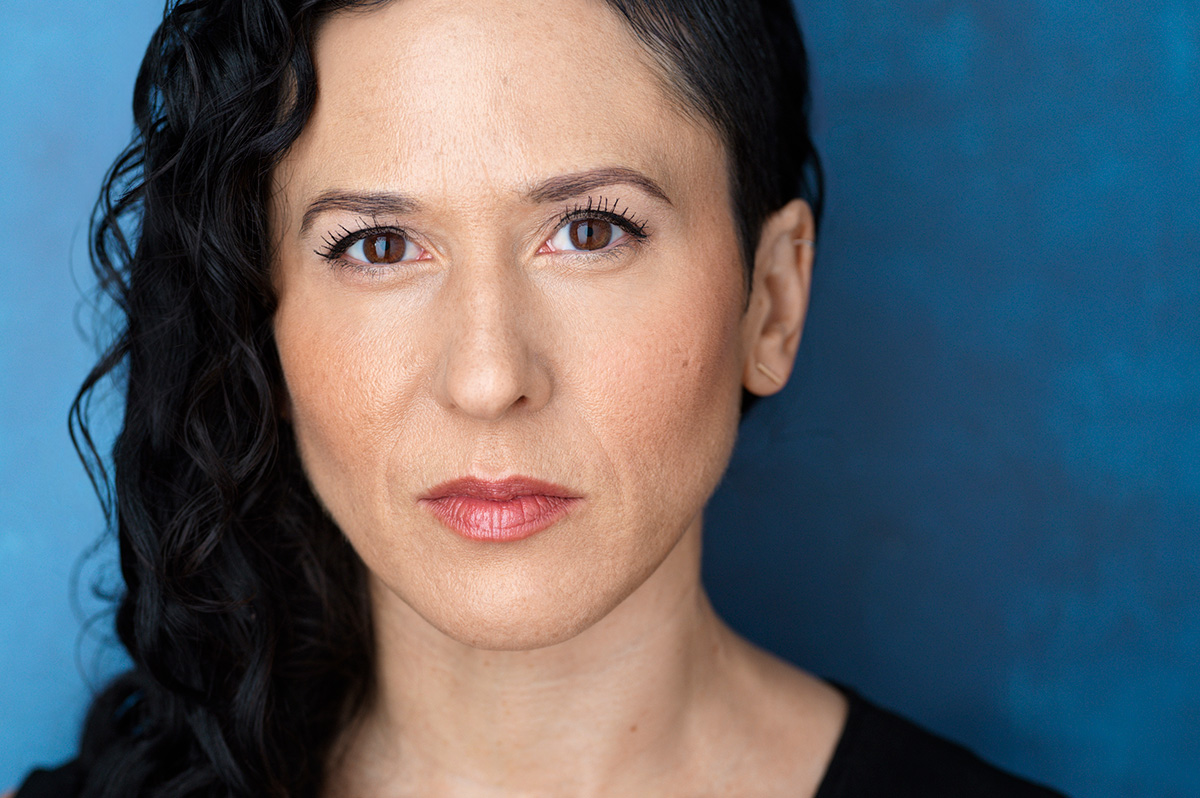
‘Twelfth Night’
Through June 22
Folger Theatre
201 East Capitol St., S.E.
$20-$84
Folger.edu
Nonbinary actor Alyssa Keegan (they/them)loves tapping into the multitudes within.
Currently Keegan plays the melancholic Duke Orsino in Folger Theatre’s production of Shakespeare’s romantic comedy “Twelfth Night.” Director Mei Ann Teo describes the production as “sexy, hilarious, and devastating” and full of “elegant kink.”
Washington-based, Keegan enjoys a busy and celebrated career. Her vast biography includes Come From Away at Ford’s Theatre; Cat on a Hot Tin Roof (Helen Hayes Award, Best Actress) and Paula Vogel’s How I Learned to Drive, both at Round House Theatre; Diana Son’s Stop Kiss directedby Holly Twyford for No Rules Theatre Company; and Contractions at Studio Theatre, to name just a few.
In addition to acting, Keegan works as a polyamory and ethical non-monogamy life and relationship coach, an area of interest that grew out of personal exploration. For them, coaching seems to work hand in hand with acting.
WASHINGTON BLADE: You’re playing the lovesick Orsino in Twelfth Night. How did that come about?
ALYSSA KEEGAN: The director was looking to cast a group of actors with diverse identities; throughout auditions, there were no constraints regarding anyone’s assigned sex at birth. It was really a free for all.
BLADE: What’s your approach to the fetching, cod-piece clad nobleman?
KEEGAN: Offstage I identify as completely nonbinary; I love riding in this neutral middle space. But I also love cosplay. The ability to do that in the play gives me permission to dive completely into maleness.
So, when I made that decision to play Orsino as a bio male, suddenly the part really cracked open for me. I began looking for clues about his thoughts and opinions about things like his past relationships and his decision not to date older women.
Underneath his mask of bravura and sexuality, and his firmness of feelings, he’s quite lonely and has never really felt loved. It makes sense to me why his love for Olivia is so misguided and why he might fall in love with the Cesario/Viola character.
BLADE: As an actor, do you ever risk taking on the feelings of your characters?
KEEGAN: Prior to my mental health education, yes, and that could be toxic for me. I’ve since learned that the nervous system can’t tell the difference between real emotional distress and a that of a fully embodied character.
So, I created and share the Empowered Performer Project. [a holistic approach to performance that emphasizes the mental and emotional well-being of performing artists]. It utilizes somatic tools that help enormously when stepping into a character.
BLADE: Has changing the way you work affected your performances?
KEEGAN: I think I’m much better now. I used to have nearly debilitating stage fright. I’d spend all day dreading going onstage. I thought that was just part of the job. Now, I’ve learned to talk to my body. Prior to a performance, I can now spend my offstage time calmly gardening, working with my mental health clients, or playing with my kid. I’m just present in my life in a different way.
BLADE: Is Orsino your first time playing a male role?
KEEGAN: No. In fact, the very first time I played a male role was at the American Shakespeare Center in Staunton, Va. I played Hipolito in Thomas Middleton’s The Revenger’s Tragedy.
As Hipolito, I felt utterly male in the moment, so much so that I had audience members see me later after the show and they were surprised that I was female. They thought I was a young guy in the role. There’s something very powerful in that.
BLADE: Do you have a favorite part? Male or female?
KEEGAN: That’s tough but I think it’s Maggie the Cat. I played the hyper-female Maggie in Tennessee Williams’ Cat on a Hot Tin Roof at Round House. In the first act she didn’t stop talking for 51 minutes opposite Gregory Wooddell as Brick who barely had to speak. That lift was probably the heaviest I’ve ever been asked to do in acting.
BLADE: What about Folger’s Twelfth Night might be especially appealing to queer audiences?
KEEGAN: First and foremost is presentation. 99% of the cast identify as queer in some way.
The approach to Shakespeare’s text is one of the most bold and playful that I have ever seen. It’s unabashedly queer. The actors are here to celebrate and be loud and colorful and to advocate. It’s a powerful production, especially to do so close to the Capitol building, and that’s not lost on any of us.

